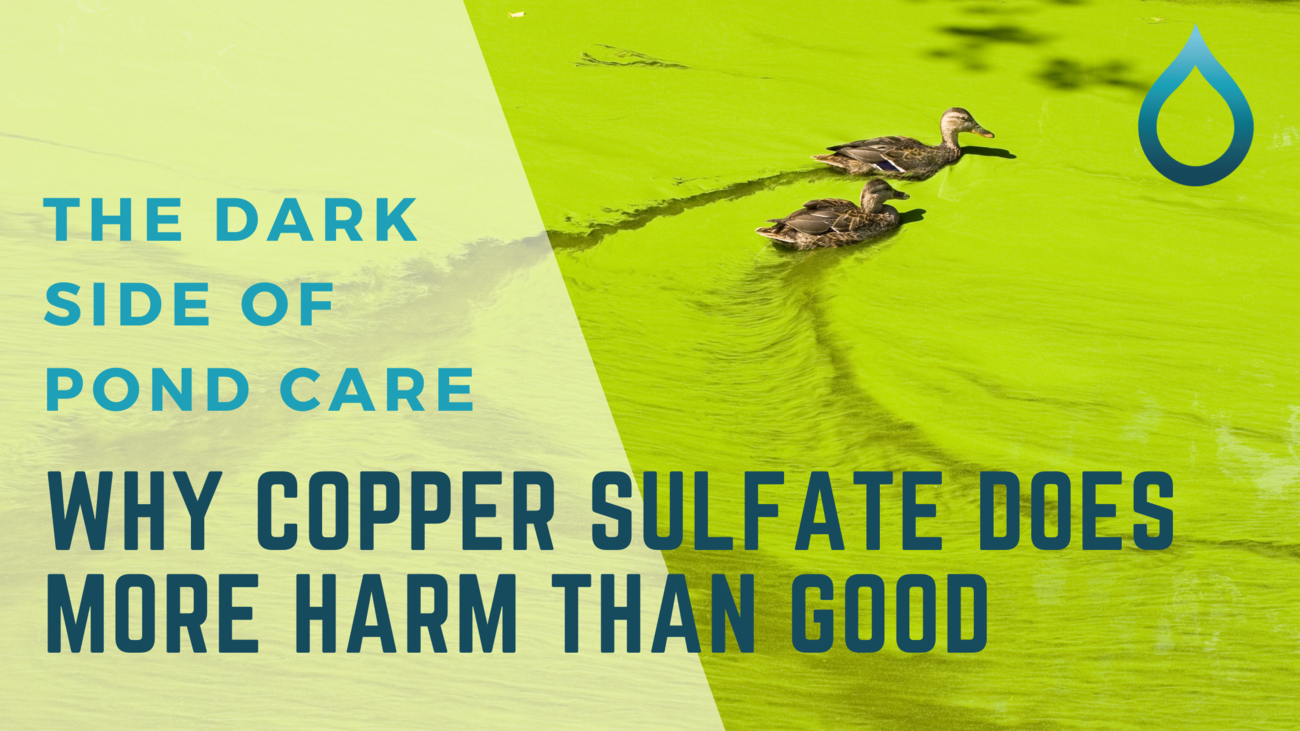
Let's be honest! Copper sulphate is a quick solution for algae growth.
But… Is it a real solution? That is a big NO. Here is why. Your pet, livestock, cattle and wildlife can’t drink from it. You can’t swim in it. Those are two big ringing bells.
Even though Copper sulfate is a common algaecide used in pond care, many people are unaware of the potential hazards associated
with its use. While it can control algae and other unwanted plant growth, it can also negatively impact the health of fish and different aquatic life and the environment.
1. Oxygen depletion

Algae are photosynthetic organisms that grow in ponds and other bodies of water. When algae die rapidly because of the use of algaecides, the rapid decomposition process can lead to oxygen depletion, which will affect the life in your pond and even cause fish kill
2. Toxicity to aquatic life
Copper sulfate is toxic to fish and other aquatic organisms at specific concentrations. Exposure to copper sulfate can lead to gill damage, reduced growth, and even fish death. Other aquatic organisms, such as crustaceans and mollusks, can also be impacted by copper sulfate, leading to decreased populations and potential ecosystem disruption.
3. Accumulation in sediment
Copper sulfate can accumulate in pond sediment over time, leading to long-term exposure for aquatic life. This can lead to chronic toxicity, even if the copper sulfate is no longer added to the pond.
4. Harmful to beneficial bacteria
Copper sulfate can also harm beneficial bacteria for maintaining a healthy pond ecosystem. These bacteria break down organic matter, and their loss can lead to decreased water quality and increased nutrient levels.
5. Environmental impact
Copper sulfate can have negative impacts on the environment beyond the pond itself. It can leach into groundwater, potentially impacting nearby drinking water sources. Additionally, copper sulfate can affect non-target organisms such as birds and other wildlife that rely on aquatic ecosystems.
6. Harmful for humans
Copper sulfate is a extremely hazardous chemical. It is toxic if ingested or absorbed into the body through the skn. Prolonged exposure can lead to skin rashes, burns, eye damage, organ failure and even death.
We strongly suggest not to use copper sulphate in your pond
.

While copper sulfate is a common tool in pond care, it is essential to understand the potential hazards associated with its use. Toxicity to aquatic life, accumulation in sediment, harm to beneficial bacteria, and negative environmental impacts are all factors to consider when deciding on pond care methods. By utilizing alternative methods and being mindful of the potential risks, pond owners can ensure a healthy and sustainable ecosystem for their aquatic inhabitants.
1. Wear protective clothing: When handling copper sulfate, wear protective clothing such as gloves, goggles, and a face mask to prevent skin and eye irritation.
2. Use appropriate dosage: Follow the manufacturer's instructions for the proper dosage to prevent overuse and reduce potential harm to aquatic life.
3. Avoid windy days: Do not apply copper sulfate on windy days as it can drift away from the intended target and potentially harm non-target organisms.
4. Store safely: Store copper sulfate in a cool, dry place out of reach of children and pets. Make sure to keep it in its original container and label it appropriately.
5. Disposal: Do not dispose of copper sulfate in the trash or pour it down the drain. Instead, contact your local hazardous waste disposal facility for proper disposal instructions.
Taking these precautions can minimize the hazards of handling copper sulfate and help protect your pond's ecosystem.
Alternatives to Copper Sulfate
Fortunately, there are many alternatives to using copper sulfate in pond care.
One effective method is to use beneficial bacteria-based products such as Nature’s Pond Conditioner, which can help maintain a healthy pond ecosystem without the harmful impacts of copper sulfate. Additionally, mechanical removal of algae and other unwanted plant growth can effectively control their populations.
Learn more about treating your pond naturally using our 3-step program RENEW REVIVE REMOVE. There is no better way than Nature’s Way.
—> https://www.koenderswatersolut...